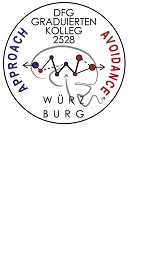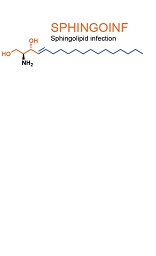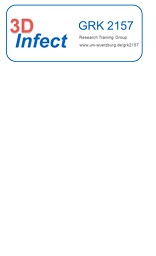Research Training Groups

The behavior of animals and humans is fundamentally characterized by approach and avoidance. Do I seek the closeness of others or do I avoid social contacts, do I face challenges or do I avoid stress? Such behavioral patterns are controlled by processes in the brain, which aim to achieve desired (approach) or avoid undesirable (avoidance) experiences and situations. As part of the Research Training Group 2660, scientists at JMU aim to better understand avoidance, approach and the tension between these two behavioral tendencies and investigate their impairment in the context of mental disorders.
Location: Würzburg
Speaker: Prof. Dr. Matthias Gamer (Institute of Psychology)
Duration: since 2021
Further information can be found here.

The Research Training Group (GRK) 2581 aims to identify targets for novel anti-infective or immunotherapeutic strategies at the level of sphingolipid metabolism. As a long-term perspective, rationally defined synthetic sphingolipid analogues or metabolizing enzymes are evaluated as therapeutic interventions in the respective disease models. The realization of these goals requires the multidisciplinary training of a new generation of young scientists who integratively implement the expertise imparted in the GRK in the fields of basic and clinical infectiology, immunology, high-end microscopy, bioorganic chemistry as well as lipid and protein analysis and bioinformatics.
Location: Würzburg
Speaker: Prof. Dr. Jürgen Seibel (Institut of Organic Chemistry)
Duration: since 2020
Further information can be found here.

The aim of GRK 2243 is to elucidate biochemical and pathogenic mechanisms of the ubiquitin system. The research thereby focuses on a deeper mechanistic understanding of disease-relevant enzymes of the ubiquitin system, which guides the subsequent analysis of the pathogenic consequences of their malfunction. The long-term goal is to identify new strategies to treat ubiquitin-related diseases. The GRK's qualification program aims to train doctoral candidates in a wide range of modern methods and concepts of ubiquitin research, spanning structural biology, biochemistry, molecular cell biology, tumor biology, microbiology, functional genomic screens, in silico drug design and proteomics.
Location: Würzburg
Speaker: Prof. Dr. Alexander Buchberger (Biocenter)
Duration: 2017-2026
Further information can be found here.

Within GRK 2157, scientists combine many years of research experience in the field of infectious diseases with innovative organoid technologies and engineering of 3D human tissue models. The broad repertoire of pathogens includes papillomaviruses, bacterial pathogens and trypanosomes as well as leishmania. Understanding the crucial processes of a natural infection forms the basis of new preventive and therapeutic strategies in the fight against infectious diseases. Research that combines such complex infection models and "next generation" technologies at the highest level requires the interdisciplinary training of a generation of scientists who are familiar with the application of these techniques.
Location: Würzburg
Speaker: Prof. Dr. Thomas Rudel (Biocenter)
Duration: 2016-2025
Further information can be found here.






